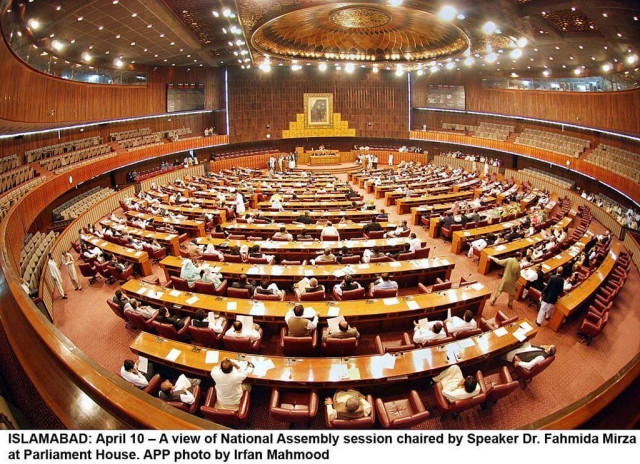NAB law tweaks get the go-ahead
Govt agrees to include opposition’s proposed amendments; formula decided to settle issue of nine ordinances

National Assembly of Pakistan. PHOTO: APP
Lawmakers from the two sides met in the chamber of the National Assembly speaker for the second consecutive day on Thursday.
The government has agreed to incorporate the opposition’s proposals in the amendments to the National Accountability Ordinance (NAO), 1999 and take it on board in the legislation process in the future.
The two sides have also reached an understanding on the nine presidential ordinances which were passed by the National Assembly in a single day in November last year.
They have agreed on a formula under which three of these bills would be considered approved while four of them would be tabled again for their passage through consensus. The remaining two will be presented again in the National Assembly after they are cleared by parliamentary committees.
The government was represented in the meeting by Law Minister Farogh Naseem, Federal Parliamentary Affairs Minister Azam Swati, Federal Planning and Development Minister Asad Umar.
The opposition lawmakers who participated in the negotiations included PML-N leaders Ayaz Sadiq, Rana Sanaullah, Rana Tanveer and Khawaja Saad Rafique and PPP’s Raja Pervez Ashraf and Naveed Qamar.
Speaking to reporters after the meeting, Sanaullah said the opposition’s proposed amendments to the accountability law included reducing the National Accountability Bureau’s (NAB) remand period and curbing the discretionary powers of the anti-corruption body’s chairman to arrest anyone.
The ruling PTI has been under fire for bypassing parliament and resorting to presidential ordinances for legislation.
The government’s move to amend the NAO, 1999 through a presidential decree did not go down well with the opposition parties which called it an attempt by the ruling party to shield its own corrupt leaders from accountability.
The Rahbar Committee, the decision-making panel of all opposition parties, rejected the newly promulgated National Accountability (Amendment) Ordinance, 2019 and demanded that the matter be discussed in parliament.
The government defended the move saying that the new ordinance would ensure nobody is treated unfairly and it would eventually go to parliament as it was only effective for a minimum of four months and a maximum of eight months.
The new ordinance limits the sweeping powers of NAB to act against any individual accused of financial corruption at will. It offers more protection to public office-holders or government officials while at the same time excludes several financial sectors from the purview of NAB.
The premier had ordered government ministers to reach out to the opposition and build a consensus on the amendments.



















COMMENTS
Comments are moderated and generally will be posted if they are on-topic and not abusive.
For more information, please see our Comments FAQ